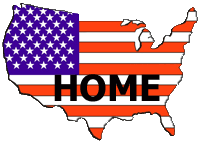Lesson Five: What is a Politician
In this lesson, students learned about what a politician does and how to become one. We then discussed how Lincoln became a politician and made a timeline of his political career. To end the lesson, the students particpated in a debate, to do a job that Lincoln so often did (i.e. Lincoln-Douglas Debates).
Politician Information
• Politicians run for government offices.
• They are elected by the people.
• Politicians are part of the government. That means they have a huge
influence on making and passing laws.
• Politicians usually take something called a platform. A platform is
something they believe in and they talk about these beliefs when they are
campaigning to win an office. When elected, they try their best to make laws
about their platform.
• Some politicians work more than others. George Bush has a full time
job as a politician, but some Representatives only work part time. They also
have other jobs.
• A person has to live in the area he or she is running for. If you
want to be a representative for Coles County, you have to live in Coles County.
• Most people who are politicians usually have experience in business,
teaching or legal practice. Legal practice means you were a lawyer or worked
for a lawyer.
• They also have to be a good speaker, sincere and honest.
Lincoln's Political Timeline
1832 - Lincoln runs for state legislature. He is in favor of local improvements
(making roads and canals). Lincoln does not win this election.
1834 - Runs again for the state legislature. He is one of the four selected to be in the Illinois House of Representatives.
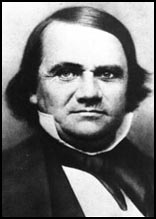 1836
– Lincoln elected for 2nd term. Moves to Springfield (the new capital).
1836
– Lincoln elected for 2nd term. Moves to Springfield (the new capital).
Lincoln first meets Stephen Douglas. Lincoln and Douglas debate in a law office with their friends. Lincoln favors strong government, but Douglas does not.
1838 – Lincoln wins reelection.
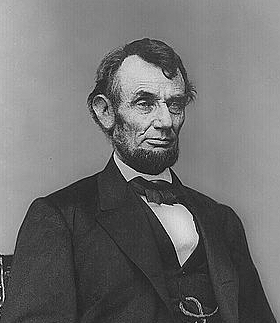 1840
– Lincoln wins reelection. He is elected into the Whig’s State
Central Committee and again debates with Stephen Douglas.
1840
– Lincoln wins reelection. He is elected into the Whig’s State
Central Committee and again debates with Stephen Douglas.
1846 - He wins the party’s nomination for congress. He is elected on to the U.S. House of Representatives. Major issues at the time are the spread of slavery and the war between the U.S. and Mexico. Lincoln is against the war. It almost costs him his career. Lincoln supports a bill to prohibit slavery in Mexican territory
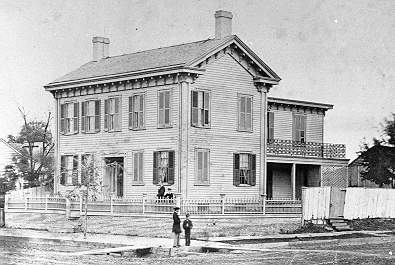 1849
– Lincoln leaves politics, and moves back home.
1849
– Lincoln leaves politics, and moves back home.
1854 – Lincoln comes back to politics. He campaigns for anti-slavery Whig candidates.
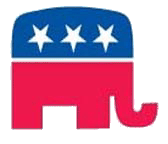 1856
- Lincoln becomes a Republican.
1856
- Lincoln becomes a Republican.
1858 - He wins the party’s nomination to run for the senate. He debates with Douglas for this position. They debate in 7 cities around Illinois. Douglas wins the Senate seat.
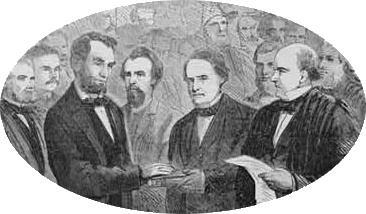 1860
- Lincoln and Douglas compete for President. Lincoln wins!
1860
- Lincoln and Douglas compete for President. Lincoln wins!
This is a picture of the cities that Lincoln and Douglas debated in. The circles represent the cities they debated in.
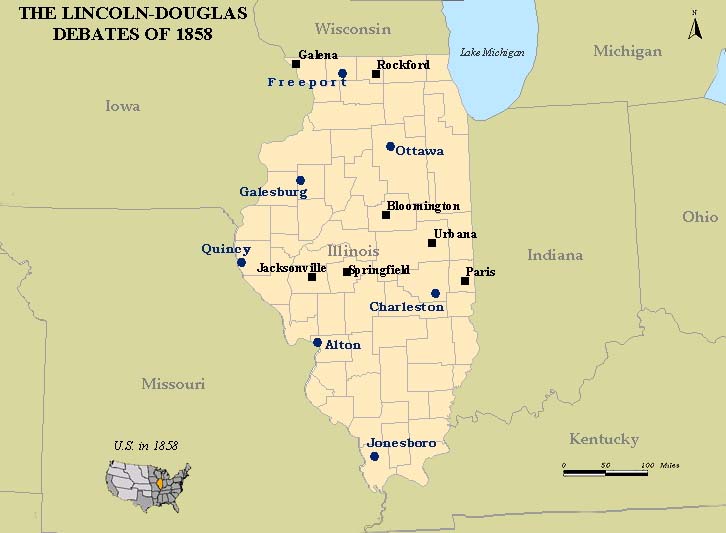
1. Washington Square, Ottawa, Illinois
2. Freeport, Illinois
Over 15,000 people attended the original debate in Freeport, then a town of
5,000. Freeport Doctrine, which was the result of the debate, states people
had the right to choose whether or not to exclude slavery from their limits.
3. Union County Fairgrounds, Jonesboro, Illinois
Union County Fairgrounds is today part of Shawnee National Forest's Lincoln
Park) Union County is south of the Mason-Dixon Line. The debate subject split
families into Confederate & Union factions. Over 50 cemeteries throughout
Union County tell of many who lost their lives in the War Between the States
4. Coles County Fairgrounds, Charleston, Illinois
This was area was very familiar to Lincoln. Lincoln's father had lived and
died here. Lincoln's stepmother & many relatives & friends lived here
too. Lincoln had a thriving law practice in the community. A majority of the
townspeople had come from Kentucky and Tennessee, moving north to avoid competition
with slave labor. Most were poor and believed they had no chance to win out
in the competition with slave labor.
5. Old Main, Knox College, Galesburg, Illinois The east side on East South
St. between Cedar and South Cherry Streets was the site of the original debate.
This location has the only currently remain structure from the original debates.
6. Washington Park, Quincy, Illinois
7. Broadway & Market Streets, Alton, Illinois
Resources
Bureau of Labor Statistics (2006, April 27). Politician. Retrieved
March 23, 2007, from http://www.bls.gov/k12/social03.htm
Freedman, R. (1987). Lincoln: A photobiography. New York: Clarion Books. 20-62.
Lincoln – Douglas debates of 1858. (2003). Retrieved March 23, 2007,
from http://www.illinoiscivilwar.org/debates.html
